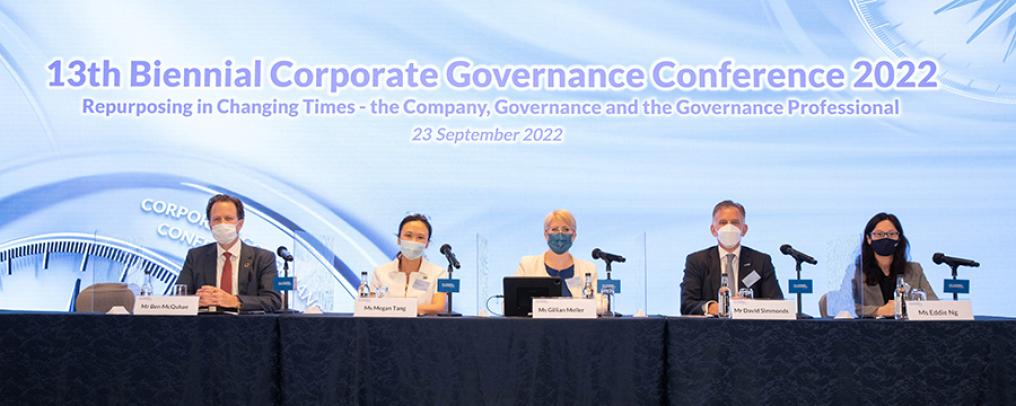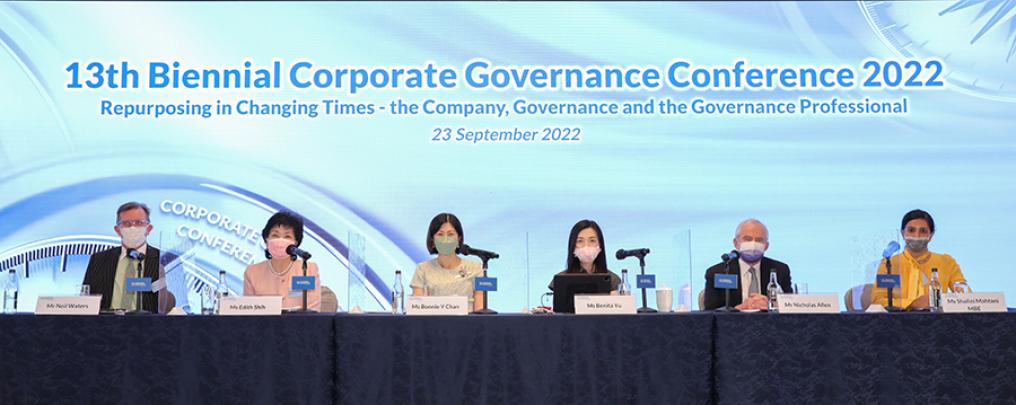The International Sustainability Standards Board (ISSB) was launched last year by the IFRS Foundation to develop a global baseline of sustainability-related disclosures. As a Vice-Chair of the IFRS Foundation, Senior Partner in the Hong Kong office of Freshfields Bruckhaus Deringer and also the firm’s China Chairman, Teresa Ko JP BBS FCG HKFCG shares her valuable perspective on the significance of the work of the ISSB for organisations here in Hong Kong.
Some of you may remember a movie called The Inconvenient Truth produced by former US Vice-President Al Gore in a campaign to educate people about global warming. That was in 2006, 16 years ago. Five years ago, he said that ‘the green revolution is bigger than the industrial revolution and happening at a faster pace than the digital revolution’.
I cannot think of a better sentence to give global context to developments in ESG and sustainability. Here in Hong Kong, our capital formation market is Asia’s third-largest stock market and has been ranked as the top IPO venue worldwide in seven out of the past 13 years. At the same time, Asia Pacific is home to five of the 10 largest emitters in the world and accounts for about 45% of global greenhouse gas (GHG) emissions due to its significant population.
We have seen our fair share of climate disasters, including devastating flooding in the Mainland and Pakistan, 49-degree heatwaves in India and tropical storms in the Philippines. At the same time, the opportunities for new technology and innovation to help transition our economy to fight climate change have never been more plentiful – and this is not just bluff.
According to a recent McKinsey report (The Road Ahead: Sustainable, Inclusive Growth, published in January 2022), climate change will cost an extra US$3.5 trillion a year of total capital spending globally on physical assets and about US$1 trillion per year in Asia by governments, businesses and individuals to transition to a low carbon economy.
What has all this got to do with reporting or disclosure?
Currently, the disclosure landscape is suboptimal. With so many frameworks, scorecards and matrices, preparers are suffering from disclosure fatigue because the more they disclose, the more they are asked to disclose. Investors do not have reliable data and cannot compare within sectors, industries or across the indices, let alone globally.
There are also many different frameworks to measure carbon emissions, a necessary focus during the transition to a low carbon economy. The GHG Protocol, the PCAF (Partnership for Carbon Accounting Financials) and ISO, all use different boundaries, assumptions and data.
Why is the IFRS Foundation getting involved?
For those who don’t know, the IFRS Foundation was set up 20 years ago to converge national accounting standards. Some may remember that we had HK GAAP, French GAAP, UK GAAP and now 144 jurisdictions around the world mandate the use of IFRS Standards.
In 2019, the IFRS Foundation had a five-year strategy review which resulted in a consultation with our stakeholders to ask if we should get involved in sustainability reporting. It was a demand-led process and we responded to the overwhelming demand that the IFRS Foundation should take on sustainability reporting.
So, fast forward to last November at the United Nations Climate Change Conference (COP26) meeting in Glasgow, the IFRS Foundation announced the establishment of the ISSB with a remit to develop a global baseline of sustainability- related disclosures. It is a sister board sitting next to the International Accounting Standards Board (IASB). For the first time, accounting standards and sustainability standards will be developed under one roof, the IFRS Foundation. The ISSB will:
- start with climate first, but not climate only
- focus on the information needs of investors, and
- will not start from scratch, but build on existing work.
We have a building block approach and aim to be interoperable. This means that the new standards will be compatible in other jurisdictions like continental Europe and will not conflict with requirements which focus on a broader set of stakeholders beyond investors, like societies and communities.
Consolidation, reduction of fragmentation and reduction of multiple disclosure frameworks in the marketplace is our goal. In fact, the IFRS Foundation has this year consolidated two leading standard-setters, the CDSB (Climate Disclosure Standards Board) and the VRF (Value Reporting Foundation) into the IFRS Foundation. The VRF is itself a merger between the Sustainability Accounting Standards Board (SASB) and the Integrated Reporting Council.
We are also extremely focused on the needs of emerging and developing economies, as well as smaller and medium-sized companies and others within global supply chains.
What has the ISSB done so far?
While the IFRS 17 on insurance took 10 years to produce, in March this year the ISSB published its first two exposure drafts, namely, S1 on general sustainability-related financial information and S2 on climate-related disclosures. Both exposure drafts are built on the four ‘pillars’ used in the Task Force on Climate-related Financial Disclosures (TCFD) recommendations – governance, strategy, risk management, and targets and metrics. They aim to establish the global baseline of sustainability-related disclosures which the ISSB was set up to create.
The global baseline requires companies to disclose a complete set of sustainability-related financial information focusing on enterprise value. This requires insight into sustainability-related risks and opportunities that affect enterprise value. The expectation is to allow investors to assess a company’s business model, its resources and relationships with customers, suppliers and other stakeholders to ensure that its strategy and business is sustainable.
The focus is on the company’s future cash flows over the short, medium and long term, and the value of those cash flows against the entity’s risk profile and cost of capital. The proposals related to non-industry-based climate disclosures are based on the TCFD recommendations, and the industry-based proposed requirements are derived from the SASB Standards. The proposal is that you would only need to apply those industry-based requirements applicable to your business.
ISSB received more than 1,300 sets of comments and during its four-month consultation period (which ended on 29 July 2022). Overall, the response has been positive. Stakeholders generally support the need for a global baseline of sustainability disclosure. There are, however, calls for more clarity in terms of the meaning of some of the terms used, such as ‘significant’, ‘material’, ‘sustainability’ and ‘enterprise value’. Many respondents also asked for more detailed guidance with illustrative examples.
Will the ISSB proposals conflict with the approaches taken in the US and Europe?
Many readers will know that the US Securities and Exchange Commission has made proposals on climate risk disclosures and the European Financial Reporting Advisory Group (EFRAG) has issued exposure drafts on its European Sustainability Reporting Standards. Thankfully these proposals, together with the ISSB proposals, draw heavily on the TCFD recommendations. All three approaches call directly for disclosure of Scope 3 emissions (that is indirect emissions from a company’s value chain) and they all ask for assurance.
They differ, however, in their level of prescriptiveness and scope, with the EFRAG proposals being the most prescriptive. I can assure you that a lot of work is being done to ensure alignment between the three sets of proposals, to the extent possible.
In addition to an advisory council to support the work of ISSB, a multijurisdictional working group comprising representatives from the Mainland’s Ministry of Finance, the European Commission, EFRAG, together with regulatory authorities in Japan, the UK and the US, and with IOSCO as an observer, has been formed to work on alignment of concepts, definition and terminology, with a view to enhance compatibility between our global baseline and jurisdictional initiatives.
A Sustainability Consultative Committee (SCC) has also been formed comprising members from the International Monetary Fund, OECD, the United Nations and the World Bank to provide advice for the new standards.
Also, ISSB has a multilocation model operating out of offices in Frankfurt, Montreal (where I visited and saw the inauguration of the office in June), San Francisco and Tokyo, and one more location in Asia to be announced. This global footprint will help with outreach and ongoing engagement with stakeholders.
How will these global developments affect Hong Kong?
Here in Hong Kong, we started our ESG journey quite early, launching our first set of voluntary ESG disclosures for listed companies in 2011. These were enthusiastically embraced, probably by the people who did all the work – company secretaries, and their corporate social responsibility and human resources colleagues. So much so that two years ago, Hong Kong Exchanges and Clearing Ltd (HKEX) had to remind listed companies that they should focus on providing material disclosures.
In particular, users of corporate reports want the board to tell them what is material and they want the board to be responsible. In July 2020, Hong Kong public listed companies were required for the first time to disclose a statement from the board on its oversight of ESG issues, approach and strategy, and a review of progress made against ESG-related goals and targets.
Two years ago, the Securities and Futures Commission (SFC) and the Hong Kong Monetary Authority (HKMA) also established the Green and Sustainability Finance Cross Agency Steering Group. This is to coordinate the management of climate and environmental risks in the financial sector, to accelerate the growth of green and sustainable finance in Hong Kong and to support the government’s climate strategies.
The SFC, in its response letter to the ISSB’s exposure drafts, supports a global baseline of sustainability standards and has been considering how the requirements under the exposure drafts can be adopted as part of Hong Kong’s domestic reporting framework.
Personal thoughts
Let me finish with three takeaways.
1. ESG disclosure is no longer a tick-the-box exercise
Disclosure tells you what each company is doing in its sustainability journey, and reflects the role and efforts of everyone up and down the company in this journey. It is not just paperwork and reporting is not an end in itself. Disclosure can be a catalyst for companies to integrate ESG into their operations and build resilience through its internal processes, corporate governance structure and products and services. But you need to write to reflect the material actions, not copy and paste.
Disclosure is also the bedrock of investment. Investors need complete and accurate data and information that hopefully will be comparable, consistent and decision-useful. The sooner companies get to grips with this, the sooner they will reap the benefits of this harsh reality.
2. It is no longer acceptable to just make claims about sustainability without taking real action
We all know that sustainability has become a major commercial enterprise and allegations of greenwashing are not only harmful to companies, but undermine global efforts and proper allocation of capital towards a net-zero transition.
Conversations in the board rooms, at least in the UK, have shifted to asking if ESG claims are real, or are they just paying lip service? Board directors are increasingly asking management to show the work that has been done to substantiate claims. So, scrub marketing spiel on the company’s website and beware of inadvertent greenwashing – activists are on the warpath and Asia will not be out of their reach.
3. Please follow the progress of the work of the ISSB
The work of the ISSB is a once-in- a-generation opportunity to bring about real change. I would urge everyone to follow the progress of its work and efforts, globally and locally, to promote a global baseline of sustainability reporting.
Once the two ISSB standards have been endorsed by IOSCO, HKEX will put out a consultation paper to propose changes to the Listing Rules in Hong Kong. I believe this will happen next year.
But at the end of the day, the ISSB can only set standards. We need our publicly listed companies to help bring about real change to make our world more sustainable. Each and every single one of you has a role to play – influence your leaders to work together for a sustainable future.
I will leave you with what I consider to be the best definition of sustainability, which comes from the first comprehensive treatise on forestry in 1713 (even older than my firm Freshfields, as we started in 1743). The definition in the forestry manual advocates sustainability as ‘never harvesting more than the forest can regenerate’. I can’t agree more, as our future depends on leaving resources not only for our next generation, but for generations to come.
Teresa Ko JP BBS FCG HKFCG
Senior Partner, Hong Kong, and China Chairman, Freshfields Bruckhaus Deringer and Co-Vice-Chair, IFRS Foundation
This article is based on Teresa Ko’s presentation (The Pressing Issue of our Times – Climate Change and Harmonising Reporting Standards) at the Institute’s CGC 2022.



